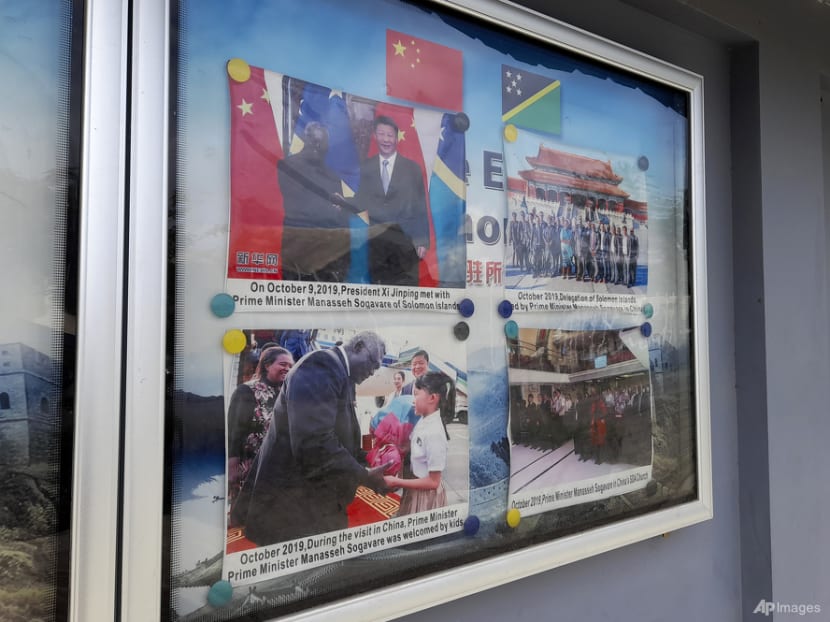Commentary: Even those who don’t know Solomon Islands should take note of its security pact with China
A security pact between the Solomon Islands and China could raise the stakes in the Pacific. Australia may lose its traditionally influential position in the region unless it does more to help with economic and climate change challenges, says former diplomat Dr Anne-Marie Schleich.

A display case shows photos outside the Chinese Embassy in Honiara, Solomon Islands, on Saturday, Apr 2, 2022. Seeking to counter international fears regarding its new security alliance with China, the Solomon Islands said it won't allow China to build a military base there. (AP Photo/Charley Piringi)
SINGAPORE: Few people could have predicted that the Solomon Islands, a small Pacific nation many would have trouble placing on a map, would become a hot topic in United States-China relations and the Australian election campaign.
On Apr 19, the Chinese Foreign Ministry spokesman announced that the Solomon Islands had signed a security cooperation pact with China. It would involve China cooperating with the Solomon Islands on "maintaining social order, protecting people's safety, aid, combating natural disasters and helping safeguard national security”.
Already in March, a leaked draft security agreement sent shockwaves. The Australian, US and New Zealand governments were caught by surprise and feared this might allow China to establish a military presence in the South Pacific.
US and Australian envoys immediately went on the offensive, hoping to court or pressure Solomon Islands Prime Minister Manasseh Sogavare about the pact, warning of destabilisation of the region by allowing an outside power a strategic foothold in the region. Earlier in February, the US pledged to reopen its embassy in Honiara which it closed 29 years ago.
CHINA’S STRATEGIC INTENT IN THE PACIFIC
A potential naval base would put China less than 2,000 km away from Australia and less than 3,000 km away from US military installations on Guam and on the Marshall Islands.
The Solomon Islands’ strategic position in the South Pacific was already evident during World War II. Japanese naval and air bases on Guadalcanal, one of its major islands, became a major battleground in 1942 and 1943. The US and Australia continue to consider the South Pacific strategically important to safeguard sea lanes and communication lines.
A Chinese naval foothold or a dual-use facility could have severe implications, as it would threaten their intelligence-gathering and communications, and undermine traditional Western dominance in the South Pacific.
In fact, China and another Pacific nation, Fiji, had already concluded similar police and defence deals in 2011 and 2014, which caused some concern in Australia but not internationally. Fiji was at that time under military rule and had turned to China for its security concerns.
Sogavare has vehemently denied the possibility of a future Chinese naval base. He criticised the Australian and US governments for interfering in internal politics and lamented the lack of transparency of the September 2021 AUKUS pact between the US, the UK and Australia which had caused consternation among members of the regional Pacific Island Forum (PIF). The recent meeting between the Australian and the Solomon Islands foreign ministers could indicate a first step towards a toning down of reciprocal accusations.
HONIARA’S CLOSE ECONOMIC TIES WITH BEIJING
But it’s also unsurprising that the Solomon Islands, like some other Pacific nations, are drawn towards Beijing and its economic potential.
The Solomon Islands is one of Asia-Pacific’s poorest nations. It has a high unemployment rate, especially among youth, and is highly dependent on foreign aid for its development budget. GDP growth has steadily declined since 2016 to -4.4 per cent in 2020. Its economy is mainly reliant on timber logging (70 per cent of its exports) and tuna fishing, and the COVID-19 pandemic has reduced tourism income.
In 2019, shortly after the Solomon Islands switched diplomatic recognition from Taiwan to China, it signed on to Chinese President Xi Jinping’s signature Belt and Road infrastructure initiative, joining other Pacific nations like Fiji and Tonga. It also reached a deal with Beijing for the construction of the national stadium to be used in the 2023 Pacific Games that it will host.
China is already the Solomon Islands’ biggest trading partner: In 2020, 64 per cent of its exports (US$312 million) went to China compared to 1 per cent to Australia. In terms of imports, 34 per cent of goods came from China compared to 13.5 per cent from Australia. The US is not even among its top 10 main trading partners.
With Chinese offers of more cooperation initiatives, Sogavare seized the opportunity to “diversify partnerships”. And Chinese engagement will only increase – preparations are underway for additional cooperation in trade and other areas.
Still, the Solomon Islands will have to keep up its balancing act given its dependence on foreign aid. Australia remains the largest aid donor to the Pacific Island countries, while China comes in at a distant fourth. However, Australia’s aid to the Solomon Islands decreased by 43 per cent to only US$129 million in 2019.
China’s aid to the Pacific island countries also sank by 31 per cent to US$169 million, though it has engaged in large infrastructure projects with low-interest loans. Its aid and other recent financial contributions to the Solomon Islands remain opaque.
CLIMATE CHANGE IS THE REAL SECURITY THREAT
If the US or Australia wants to ensure their stake in the Pacific, they would do well to listen to what the island nations are saying: Pacific Island countries face an existential threat because of climate change.
“The big conversation for the Pacific is not necessarily a security conversation, but an economic conversation because the level of economic vulnerability of the Pacific has only been compounded by COVID-19 and … by climate change,” said New Zealand foreign affairs minister Nanaia Mahuta in May.
The Pacific Elders’ Voice Group, which includes former political leaders of Kiribati, the Marshall Islands, Palau and Tuvalu, recently issued a statement claiming that it was climate change, not military bases that needed the most urgent attention.
Pacific nations have long accused Australia of its lack of action. They say Australia’s influence in the Pacific has weakened because of Australian Prime Minister Scott Morrison’s government’s unambitious domestic carbon emissions policy and its reluctant position in international climate negotiations.
Morrison has insisted that the coal sector will remain an important part of the economy. This puts Australia and the Pacific island nations in opposing climate camps.
China – the world’s biggest carbon emitter with coal meeting 57 per cent of its energy needs – will increase its emissions before 2030 and reach carbon neutrality only by 2060. It has not fully supported the climate initiatives of the Pacific island countries.
CHINA NO LONGER AN OUTSIDE PACIFIC PARTNER
The fact is that China with its ongoing aid, trade and investment, is a latecomer in the region but no longer an outside Pacific power. Australia needs to recalibrate its entire relationship with the Solomon Islands and the rest of the Pacific to become more of a partner to its “Pacific family”.
There is an urgent need to tackle the basic problem of “economic fragility” of Pacific nations. One way could be to partner with them to improve their infrastructures and achieve a certain degree of economic independence. The PIF is the place to start this endeavour.
And instead of trying to compete with China in the region, it could be useful for Western nations to integrate their expertise in suitable large-scale infrastructure projects. Tapping on China’s technical and economic potential doesn’t mean relinquishing control and governance.
Just look at the successful trilateral China-New Zealand-Cook Islands project to upgrade the water supply network on the Cook Islands: It was financed with a concessional loan by the China Export-Import Bank, co-financed by New Zealand and the Cook Islands, built by a Chinese engineering company and with a governance structure proposed by the Cook Islands.
Already in 2019, the Pacific Island Forum rejected the notion that the region needed to choose between geopolitical partners – a position that should resonate with Southeast Asian countries.
Dr Anne-Marie Schleich is an Adjunct Senior Fellow at the S. Rajaratnam School of International Studies (RSIS), Nanyang Technological University, Singapore. She is a retired diplomat who was most recently the German Ambassador to New Zealand and seven Pacific Island countries.









